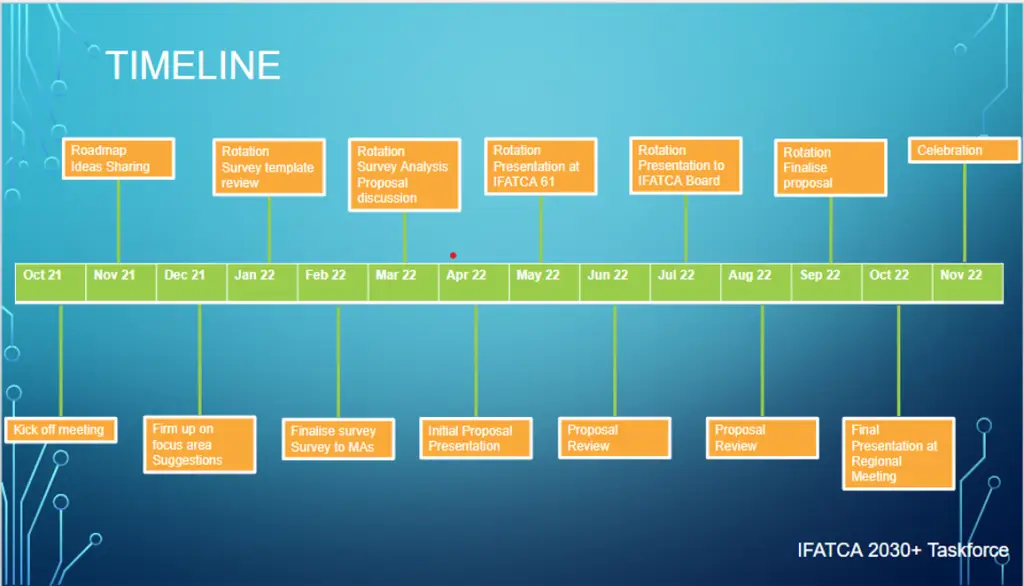IFATCA 2030+
Executive Summary
The Executive Board of IFATCA sought to gain a sense of the direction in which the Federation should be heading. While the goals of meeting the challenges of the profession and continuing to assist and promote ATCOs worldwide remain, the EB thought it is important to glean a sense of the direction that Member Associations (MAs) would like to see the federation pursue and engaged a diverse group of members from around the globe to assist in this task. The EB identified seven key areas where the Federation needs to improve or at least safeguard. These are Administration, Representation, Finance, Cohesion, Implementation, Development and Influence.
The IFATCA 2030+ Task Force designed a survey to (understand the current perception MAs have of the existing structure of IFATCA), gain a perception from the MAs to gauge feeling and viewpoints about the current structure of IFATCA and to gather their opinions on the direction that the Federation should be heading in the near future. The survey consisted of 31 questions which were designed to obtain both qualitative and quantitative data. The questions covered a range of data points. Respondents were invited to indicate the region that they represented, their role within the organisation, and compare regional and global experience and prioritise issues they would like to see the federation address.
At the end of the survey, results were collated and analysed according to region. These regional results were studied on their own merit, compared to other regions and how they contrasted against the global responses. Some common trends were identified throughout the regions. One limitation of the survey observed was the level of participation in some regions.
The Taskforce
The Taskforce is composed of experienced and active members of IFATCA Member Associations. All four regions of IFATCA were represented. Members of the Taskforce were nominated by their regional EVP. At the time of publication, the members of the IFATCA 2030+ Taskforce were as follows:
- Jaymi Steinberg, USA (AMA)
- Kendell Peter, Saint Lucia (AMA)
- Nyamgerel (Nainaa) Dasdolgor (ASP)
- Lim De Wei, Singapore (ASP)
- Nadia Bamowongo, Democratic Republic of Congo (AFM)
- Yannick Elidje Wickel, Ivory Coast (AFM)
- Nicola NìRiada, Ireland (EUR)
- Julian Ogilvie, Switzerland (EUR)
- Administration
- Representation
- Finance
- Cohesion
- Implementation
- Development
- Influence
The Questionaire
The Taskforce identified the need to produce a broad reaching questionnaire for the Member Associations to respond to. The best option was to use an online platform in order to maximise participation.
After discussion within the group about the best choice of online questionnaire tool, the decision was to use the ‘Findmind.ch’ platform at a cost of $149.99. This was deemed to be the best value/format ratio and allowed the taskforce to use the platform for a year.
Designing a questionnaire that would provide the most comprehensive results, in a way that was clear to the respondents about how to answer correctly was a significant challenge. This challenge was compounded by the fact that it had to reach a global audience with multiple languages and cultures. As a result, the group allowed 3 monthly meetings to refine the questions whilst work was conducted between them. It was also decided to offer the opportunity to complete the questionnaire in English, Spanish and French, to ensure the greatest participation and most complete answers.
The questionnaire went live at the beginning of March 2022 and ran for a total of 1 month. Regular reminders were sent out to MAs to ensure completion via email and regional WhatsApp groups.
The results were collated and scrutinised over the following months. After detailed qualitative and quantitative analysis, the results were de-identified in order to ensure the anonymity pledge made to participants by the Taskforce. An initial detailed report was presented to the Executive Board during their September pre-ANC meeting in Montreal, Canada.
The Taskforce has respected the timeline defined during our first meetings.
Questionnaire Engagement per Region
Although the response rate was encouraging, it was difficult to obtain replies or acknowledgement from each MA. It is obvious to us that the A55 document is of extreme importance to the survival of the Federation. The upkeep of this database must be a priority to ensure connectivity with the Mas. Alternative means of establishing contact and maintaining communication with MAs may be of interest to the Federation.
Evolution
The Executive Board has requested that the Taskforce produce several working papers for the annual conference 2023 to adopt. This will allow some of the recommendations to be implemented as soon as possible. Others will require more time and the involvement of the specialist committees such as the CAC and FIC.
It is envisaged that this taskforce will continue its work over the next few years. It may evolve into a different format and title moving forward, however, the need to continuously innovate the way the Federation works and ensure its relevance to MAs is of extreme importance.




